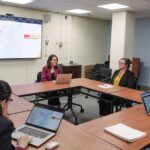
UMBC’s commitment to integrating training with research and community engagement drew Sandra Barrueco, professor of psychology,tojoin the psychology department last summer. Barrueco hit the ground running with a two-year grant of over $990,000 from the Health Resources and Services Administration (HRSA) to establish ADVANCE Maryland or, in Spanish, AVANCE Maryland. The grant provides a stipend to train 14 clinical psychology doctoral candidates and 10 social work master’s students and their faculty supervisors in delivering integrated, culturally and linguistically competent behavioral health services to children, youth, and young adults in underserved and rural English- and Spanish-speaking communities in Maryland.
“I love that UMBC is a community-engaged, R1, and minority-serving institution,” says Barrueco, who founded the BIENESTAR/Wellbeing Lab at UMBC for undergraduate and graduate researchers. BIENESTAR, the Spanish word for well-being, is an acronym for the lab’s myriad but interconnected research areas.
Preparing students for complex roles
Graduate students en route to becoming licensed psychologists require hands-on training to develop expertise in promoting well-being and prevention through diagnosing, treating, and managing psychological disorders in diverse settings. Barrueco, along with other UMBC psychology faculty, dedicates time to guiding students in the clinical track of the Ph.D. human services psychology program through the complexities of their roles, ensuring they are well-prepared for the challenges they will face in their careers.
“The psychology department is exactly all I embody—community, clinical, and developmental psychology—since I work extensively with children and families. So, it is a great fit in that way,” says Barrueco, who came to UMBC after nearly 20 years at Catholic University in Washington, D.C., where she was associate dean for graduate programs and research in the School of Arts and Sciences, a full professor, director of clinical psychology, and co-founder of Catholic University’s Institute for Latin American and Iberian Studies.
“Living in Maryland, I can see the needs of our local communities,” says Barrueco, “and the big-picture perspective of what UMBC has the capacity to do at a state level.” It’s a goal that requires partners. The grant’s foundation is an interdisciplinary partnership with over 20 institutions and organizations, including partnerships with Melissa Smith, associate professor of social work at the University of Maryland School of Social Work, with experiential sites, and with community and government organizations serving children, youth, and young adults in Maryland’s underserved and rural communities.
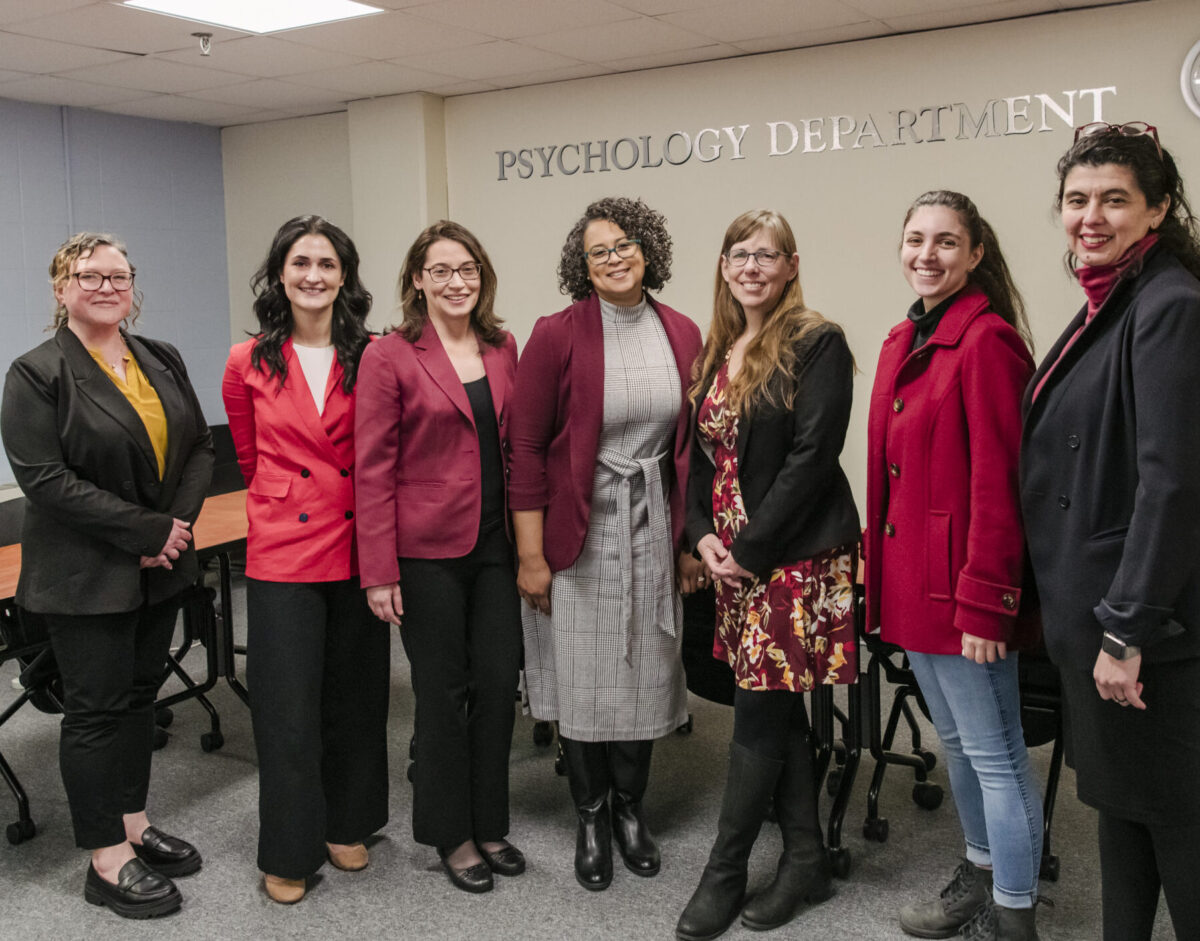 (l-r): Emily Lipsitz-Wardrick, a master of social work student at the University of Maryland School of Social Work, Pamela Rakhshan Rouhakhtar, Sandra Barrueco, Melissa Smith, Rebecca Schacht, Samantha Berg, and Doha Chibani ’08, psychology, M.P.P. ’22, public policy, UMBC psychology doctoral student, the department’s clinical coordinator, and director of clinical services at the STRIVE for Wellness Clinic. (Marlayna Demond ’11/UMBC)
(l-r): Emily Lipsitz-Wardrick, a master of social work student at the University of Maryland School of Social Work, Pamela Rakhshan Rouhakhtar, Sandra Barrueco, Melissa Smith, Rebecca Schacht, Samantha Berg, and Doha Chibani ’08, psychology, M.P.P. ’22, public policy, UMBC psychology doctoral student, the department’s clinical coordinator, and director of clinical services at the STRIVE for Wellness Clinic. (Marlayna Demond ’11/UMBC)
“There’s often a lot of underfunding of doctoral and master’s students to pursue mental health training and to work in the field,” explains Barrueco. ADVANCE/AVANCE Maryland is changing that. Half of the grant purposefully funds graduate students and there is additional support to enhance the training of faculty and current service providers to prepare the next wave of psychology professionals to meet the needs of all communities affected by the national mental health crisis.
Barrueco notes that the students are in placements across the region with clients from various backgrounds. Through the grant, students learn how to provide services for culturally and linguistically diverse youth.
“One of the skills they are learning is how to work with interpreters. There are hundreds of languages in the immediate area, so it is a broader focus,” says Barrueco, who has expertise in Spanish. Since most bilingual speakers in the region are Spanish-speaking, students can get a strong sense of that community and learn from Barrueco’s expertise.
One-to-one solution
Samantha Berg, a fourth-year clinical psychology doctoral student in the human services psychology program at UMBC, is a research assistant at the Strive for Wellness Clinic, which provides evidence-based care to youth ages 14 – 25 through individual and family therapy, medication management, teletherapy, outreach and education, and consultation and assessment. The wellness clinic is run through a partnership between UMBC, the Maryland Early Intervention Program, the University of Maryland School of Medicine, the Maryland Coalition of Families, and On Our Own Maryland.
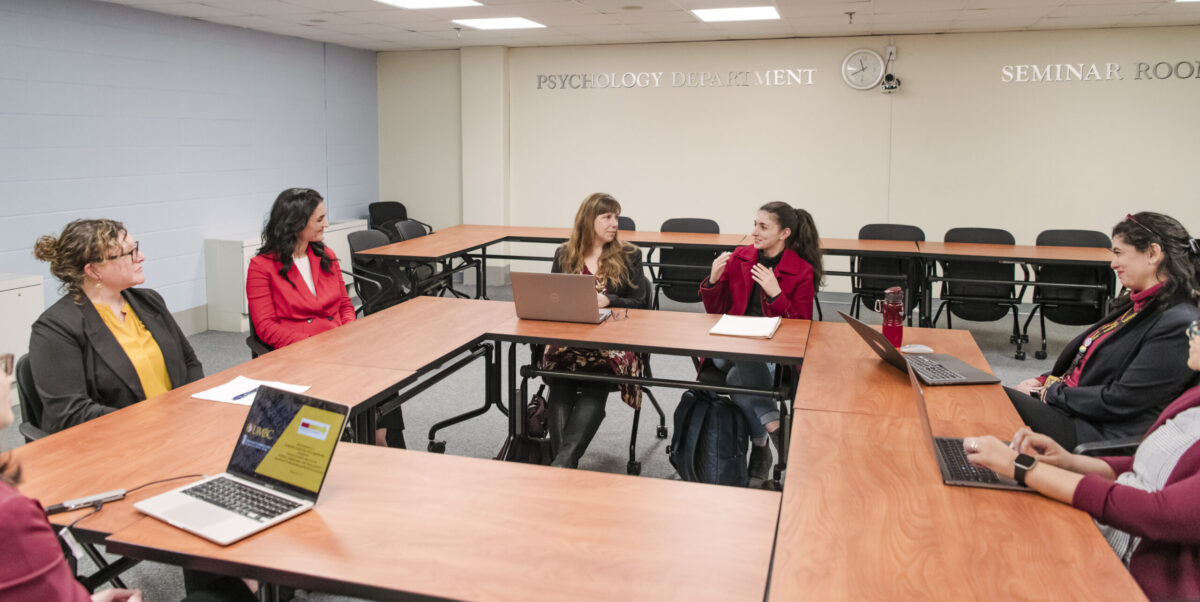 Samantha Berg (center in red coat) sits next to her advisor, Rebecca Schacht, sharing insights from her ADVANCE/AVANCE fellowship. (Marlayna Demond ’11/UMBC)
Samantha Berg (center in red coat) sits next to her advisor, Rebecca Schacht, sharing insights from her ADVANCE/AVANCE fellowship. (Marlayna Demond ’11/UMBC)
Berg’s passion for understanding psychopathology across a broad spectrum began almost a decade ago. It flourished when she entered UMBC’s doctoral program and met her advisor, Rebecca Schacht, an assistant professor of psychology, and co-director of the grant. Schacht’s research explores comorbid post-traumatic stress syndrome and substance use disorders. She is the director of the UMBC Psychology Training Clinic, where she supervises doctoral research students like Berg as they deliver low-cost, evidence-based individual psychotherapy related to anxiety, depression, relationship and family issues, and other types of mental health challenges. Schacht continues to be Berg’s advisor and provides clinical supervision.
Berg’s work at the wellness clinic aligned with the goals of the ADVANCE/AVANCE Maryland grant. She was one of the grant’s first doctoral fellows. “I was excited to learn new avenues for interacting with clients, such as how to work with an interpreter to do a bilingual mental health assessment. I want to be able to assess and treat as many people as possible, to serve as many populations as possible,” explains Berg. “I think it is part of my responsibility to gain new knowledge and understanding of how to engage with clients with whom I have different language proficiency. This is a one-to-one solution for this situation.”
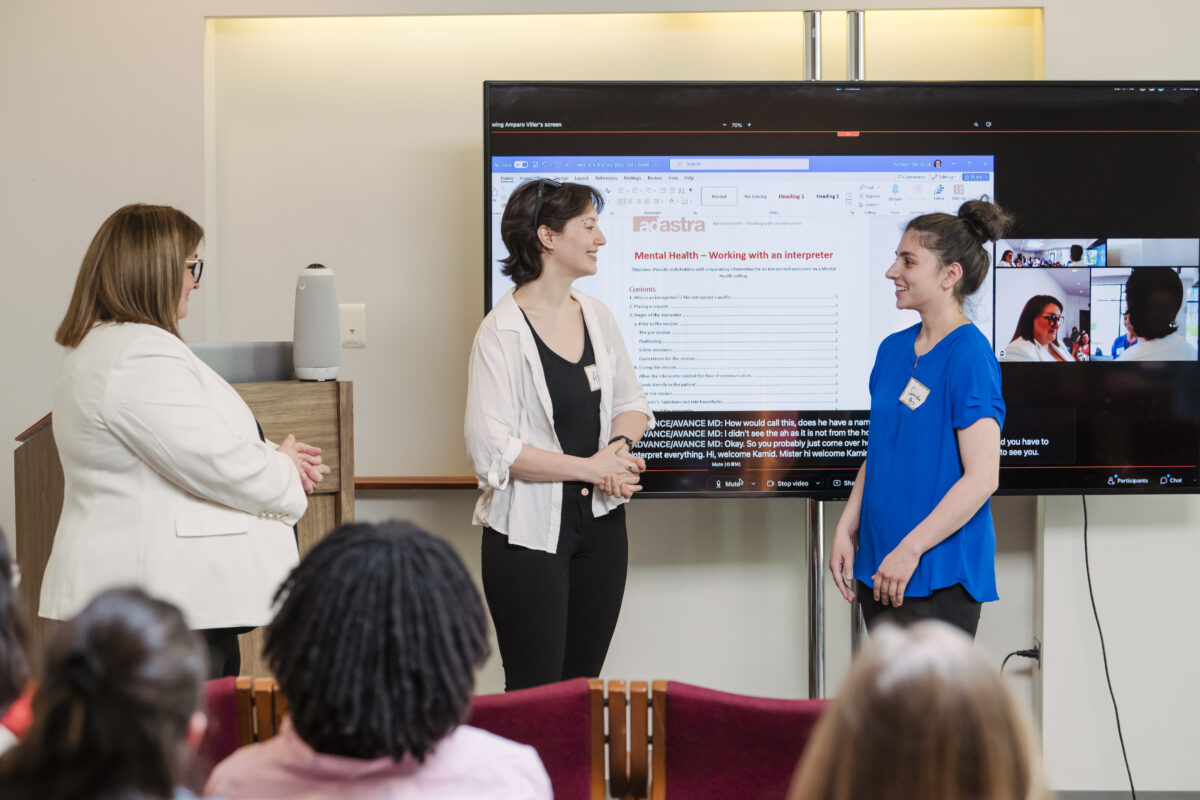 Amparo Villar Garcia (left), director of learning and development at Ad Astra language services, guides
Amparo Villar Garcia (left), director of learning and development at Ad Astra language services, guidesSamantha Berg (in blue) and an attendee through a role-play to train how to work with an interpreter. (Marlayna Demond ’11/UMBC)
She is excited to be part of a significant shift in clinical psychology as it moves from a medical model to a community-based intervention model. “Part of the intervention movement includes assessments,” says Berg. “I have a personal passion for wanting to be part of the change, part of the development of treatment.”
Developing a workforce
“It’s a huge pitfall of clinical work that there isn’t enough training on how to engage and serve people who don’t speak English,” says Danielle Farrell, another research fellow on the ADVANCE/AVANCE Maryland grant. As she looks forward to her fourth year as a clinical psychology doctoral student, Farrell appreciates having access to experiential opportunities.
Farrell studies intimate partner violence. Like Berg, Farrell was already engaged with the community ADVANCE/AVANCE Maryland will be focusing on as a research assistant at the Strive for Wellness Clinic. Farrell assessed and connected adolescents and young adults with early intervention referrals for a range of mental health concerns, primarily psychosis, under the supervision of Pamela Rakhshan Rouhakhtar, an assistant professor of psychology in the human services doctoral program, another co-director of the grant, and director of the Equity in Psychosis-Spectrum Services (EQUIPS) lab at UMBC. Faculty, graduate, and predoctoral students conduct research around psychosis-spectrum experiences, with an emphasis on psychosocial factors and access to care.
The grant’s workshops, professional development meetings, and job fairs are helping Farrell maximize the skills she’s developed for a successful career after graduation.
Big picture changes
ADVANCE/AVANCE Maryland is the culmination of decades of Barrueco’s unique research, which has been instrumental in addressing developmental and mental health difficulties among language minority, immigrant, and migrant children. Her work has led to methodological improvements in the assessment and early identification of bilingual children, expansion of the theoretical and research bases related to developmental and clinical processes, and the creation and examination of multisystemic preventive interventions fostering linguistic and socioemotional functioning. This research has advanced the field of psychology and informed policy.
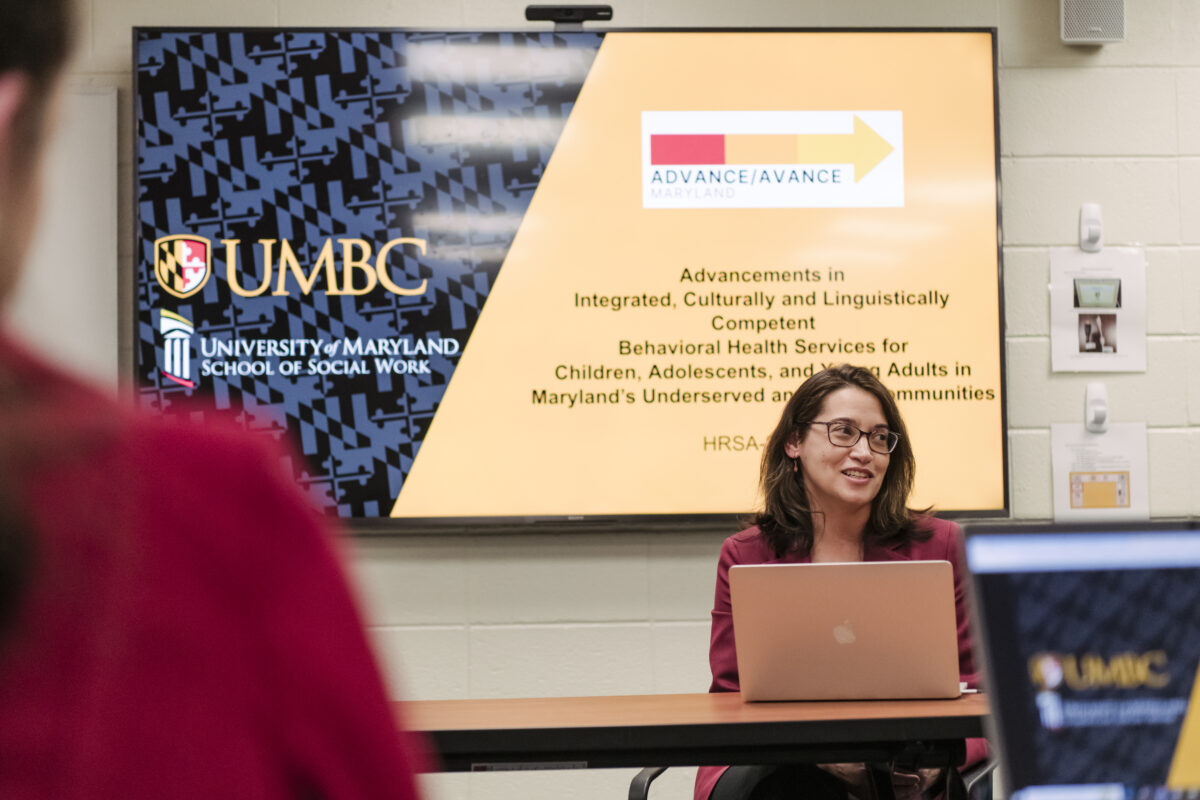 Barrueco updates the grant team. (Marlayna Demond ’11/UMBC)
Barrueco updates the grant team. (Marlayna Demond ’11/UMBC)
Barrueco, now the director of UMBC’s clinical psychology Ph.D. program, is wholeheartedly invested in the future of UMBC’s work. “When I came to UMBC, our goal was: Let’s get some big-picture changes on the table,” she shares. “Funding psychology graduate students more quickly moves the needle on youth mental health in the nation.”





